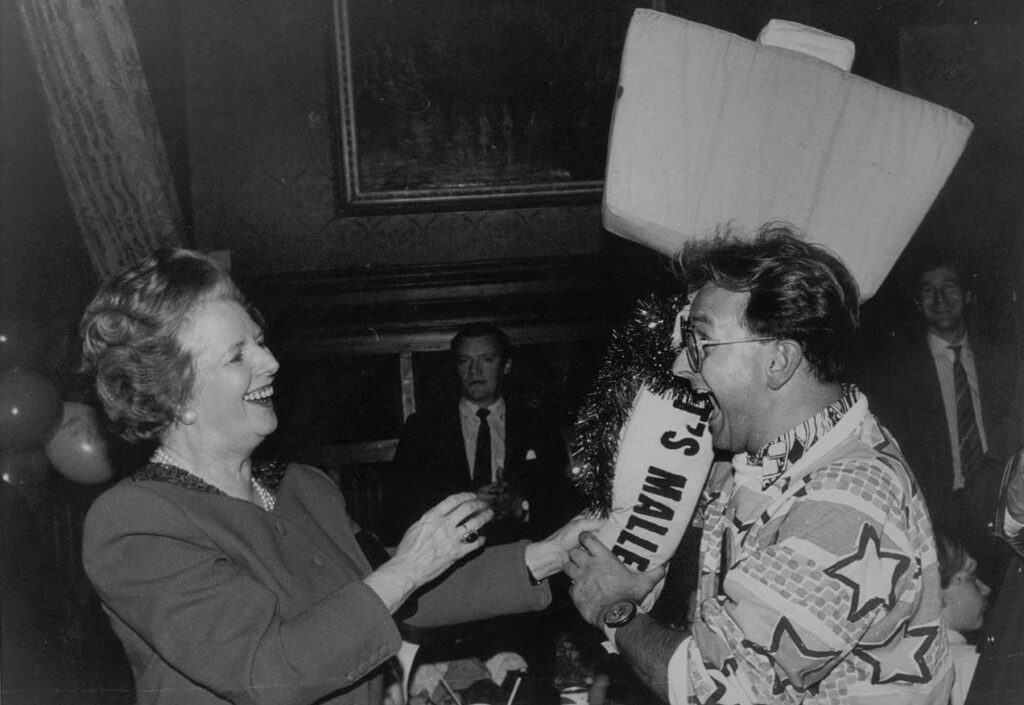
Timmy Mallett pulls up on his bike wearing two of those all-purpose Lycra snoods they sell in camping shops: one on his head (lime green) and another round his neck (white), both teaming riotously with his turquoise Peruvian jacket. The face between the snoods wears a serious expression, the jaw set and the eyes quizzical, but on the mudguards of Mallett’s bike there are three pink stickers bearing a smiling cut-out of his head in a floral cap, with the phrase “Have an utterly brilliant day” – a reference to his second best-known catchphrase (the first was “blaaah!”) and to the title of his recent memoir, Utterly Brilliant! My Life’s Journey. He throws his leg off the bike and pulls it into the pub; buys me a cup of tea and seats himself next to a fire. Thirty years after his final Wacaday episode, the most distinctive children’s presenter of the 1980s, now 66, remains serious about the business of being wacky: it is his mode, his currency and his truth.

He has come bearing a bag of gifts. A bookmark, handmade from part of a print of one of his impressionistic oil paintings: it is signed “Happy Reading, Timmy Mallett”, with little kisses where the vowels should be. There is a greetings card – another oil painting (he sells them through his website) with a quick sketch, inside, of Mallett’s Mallet, the giant foam hammer he brought down on the heads of contestants on his breakfast TV show, Wide Awake Club. The mallet clubbed Margaret Thatcher at a Christmas party for the children of MPs in the House of Commons in 1988: “she always knew a good photo op,” he says. There is a copy of his book in the bag too, with a foreword by Michaela Strachan, who worked alongside him on the Wide Awake Club. And a little name tag, bearing the name Martin Mallett, the younger brother with Down’s syndrome who passed away in 2018.
A week after his brother’s death, Mallett took off on his bike to do the Camino de Santiago pilgrimage on his own, a journey that formed the spine of his travelogue-memoir. Though his father was a clergyman, and Mallett’s book is published by a Christian publisher, he does not talk about faith – though he has done many pilgrimages on his bike, and after Christmas he and his wife of 30 years, Lynda, were going going to Canterbury for the anniversary of Thomas Becket’s murder. He won’t really say what motivates him to make his spiritual journeys, apart from his feverish love of history. One does not become party to Mallett’s inner life – but in his little bag of gifts, he has given me his whole story in technicolour.
We meet in Cookham, in the Maidenhead constituency of Theresa May, where Mallett has lived for many years. Before his pilgrimage, she came over to provide him with official documentation, the way the lord of the manor did in medieval times. Mallett owns a production company and still thinks in TV terms. On Boris Johnson and Peppa Pig: “A great story, a great image, the wrong place, wrong audience. In other circumstances? A fantastic moment that would have resonated.”
He knows all about modern children’s television and lists seven channels on his fingers. I try to suggest that Mallett’s was the golden age of the kids’ TV presenter, but he won’t have it. “That’s unfair. I’m not having that. Each generation has its own shows. Ant and Dec. Dick and Dom in da Bungalow. Sam and Mark on the new Crackerjack!. The two youngsters on Saturday Mash-Up!.”
Does he see his influence in Mr Tumble? “Mr Tumble is brilliant. The signing, the inclusiveness, he has made us feel very comfortable about people who are different.” His phone rings: the ringtone is “Itsy Bitsy Teeny Weeny Yellow Polka Dot Bikini”, a number one hit for Mallett and Andrew Lloyd Webber in August 1990. He watches to see this dawn on me. He laughs – the same helium laugh you heard when you were eight years old.
Mallett seems suspicious of questions trying to get him to say he did something before anyone else did – the strange addiction of journalists. As late as 2008, when he took part in I’m A Celebrity… Get Me Out Of Here, the Daily Mail described him as the most annoying man in the world: this is the reason he is remembered by many who did not watch his shows. But he certainly presided over an era of kids’ TV that was wild and sticky and raucous, and acknowledged children as the tribe they were: “You have your own jokes, your own language, your own understanding of how the world works and where you fit into it. It runs for about three or four years from the age of eight, the peak of childhood ability before adolescence, soaking it all up like blotting paper.” Why did he work so well with kids? “Why do you think I worked so well?” His questions are slightly intimidating.
What many have forgotten about Wacaday is the amount of current affairs it covered: the fall of the Berlin Wall, the release of Nelson Mandela, Gorbachev’s influence in Russia. “We said, these are world events. Children understand how the world is in flux and changing.” In Moscow, Mallett’s producer had him walk out of a dark alley into the sun, on camera, “because glasnost meant coming into the light”. He took the mallet to the Berlin Wall on 9 November 1989 and helped to bash it down. He’d brought an old friend on the show, an “Ossi” (East German) he’d met hitchhiking in 1977 (he talks about him in the singsong voice he would use explaining world events to an eight-year-old: “He’d been expelled for having the wrong sort of politics, what does that mean?”). The Ossi watched him bashing soldiers on the head, then shook his hand and left.
“I hope he understood. Was it too slapstick?” Mallett has tried to find him through Facebook: “Kate, I’m still waiting to hear!” He brought back bits of the wall and gave them away as prizes on Wacaday.
In 1991, he explained the end of apartheid to his young audience, leapfrogging with black children in a park in South Africa that formerly had been only for whites. He eyes me thoughtfully when I bring it up. But apart from the observation that South Africa was the most unpopular country in the world (“It was! No one would trade with it! That was clear, wasn’t it?”) it is a rather subtle way of showing children the horrors of segregation. Apartheid was really simple for them, he says: “It’s NOT FAIR”.
The thing about the Eighties, Mallett says, is that there was a lot of good news. “We were fortunate that we had good stories. Jubilant stories. Nelson Mandela getting released in 1990 was a jubilant story. I’m not sure it would be that easy to make gags out of what’s going on now.”
His TV career petered out rapidly when Wacaday finished in the early 1990s, but you can still book him, through his agent, to do his malletting at your event or special occasion. His energy is not dimmed. He shakes my hand, tells me what time the train back to London is, and cycles off through the topiaried gardens of Cookham. Weeks later, in the new year, I walk to my local postal depot to pick up a parcel that had been too big to fit through the letterbox. It is a mallet: yellow plush handle, giant pink squashy head, with eyes and a pair of comedy glasses. A sticker on the wrapping says “Have an utterly brilliant day”.
“Utterly Brilliant! My Life’s Journey” is published by SPCK books.
[See also: “I didn’t want anyone to know it was me”: on being Joni Mitchell’s “Carey”]



